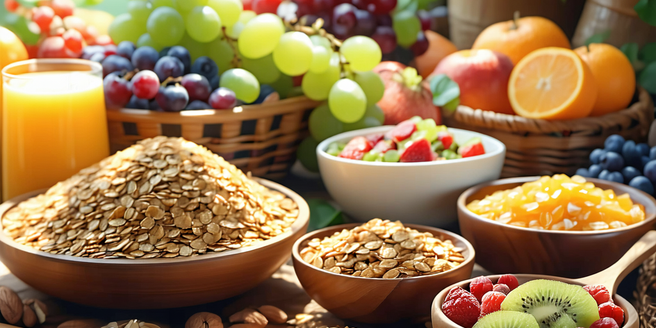
Understanding Nutritional Needs for Energy Boosts
To maintain high energy levels throughout the day, it’s vital to understand the nutritional components that play key roles in energy production. Carbohydrates are often regarded as the primary source of energy for the body, yet not all carbohydrates are created equal. Opt for complex carbs such as whole grains, fruits, and vegetables, which provide sustained energy release. Proteins, from sources like nuts, yogurt, and lean meats, aid in muscle repair and growth, vital for energy restoration. Fats, specifically from avocados, seeds, and oily fish, are crucial as they offer a concentrated energy source. Don’t forget the role of micronutrients; B vitamins, iron, and magnesium are particularly important for converting food into energy. Hydration is another often-overlooked factor, as even mild dehydration can lead to feelings of fatigue.
Top Healthy Snack Ingredients to Consider
When selecting ingredients for high-energy snacks, focus on nutrient-dense choices that offer lasting benefits. Nuts and seeds provide heart-healthy fats and proteins, making them a great base for snacks. Incorporate whole grains such as oats or quinoa, which release glucose slowly into the bloodstream, preventing energy spikes and crashes. Fresh fruits like bananas, apples, or berries are not only rich in vitamins and antioxidants but also offer natural sweetness to satisfy cravings. Consider vegetables such as carrots, celery, or cherry tomatoes for a crunchy texture and a boost of fiber. Healthy fats from avocados or natural nut butter can enhance satiety. Adding spices like cinnamon or turmeric can not only enhance flavor but also offer anti-inflammatory benefits, supporting overall health and energy.
Quick and Easy Snack Recipes for Busy Days
For those with hectic lifestyles, quick and easy snacks can make a difference in maintaining energy levels. Start with a simple trail mix combining almonds, sunflower seeds, and dried fruits for an on-the-go energy booster. Avocado toast on whole-grain bread is a nutritious option; top with sliced tomatoes or a poached egg for added protein. Overnight oats, prepared with rolled oats, yogurt, and berries, offer a ready-made breakfast high in fiber and antioxidants. Energy balls crafted from dates, cocoa powder, and peanut butter provide a sweet treat without added sugars. Greek yogurt topped with granola and fresh berries is another quick option, offering a balance of protein and carbohydrates. Choose these hassle-free recipes to keep energy high even on the busiest of days.
Snacking Tips to Sustain Energy Levels
To ensure your snacks truly serve their purpose in sustaining energy, it’s crucial to make thoughtful choices. Firstly, pay attention to portion sizes; consuming large amounts, even of healthy foods, can lead to lethargy. Opt for fresh, whole foods and avoid processed snacks which can lead to energy crashes. Timing is also key; eating every 3-4 hours can prevent dips in blood sugar levels, keeping energy steady. Combining macronutrients, such as pairing carbs with protein or healthy fats, helps slow digestion and maintain fullness longer. Monitor hydration levels, as dehydration can often be mistaken for hunger. Finally, be mindful of caffeine intake. While it can provide a temporary energy boost, relying on it heavily can counterintuitively lead to fatigue as its effects wear off.
Balancing Nutrients for Optimal Snack Benefits
Achieving the right balance of nutrients in your snacks is vital for maximizing their energy benefits. Snacks should ideally combine carbohydrates, proteins, and fats in balanced proportions. Carbohydrates provide quick energy, but coupling them with protein and fat ensures a slower absorption rate, keeping you satiated. For example, pair apple slices with almond butter or whole-grain crackers with cheese. It’s also important to consider the quality of your food choices; choose whole grains over refined, prefer fresh over processed, and opt for naturally sweet over added sugars. Incorporating a variety of fruits and vegetables ensures you’re getting a spectrum of vitamins and minerals, supporting metabolism and immune function. Adjust snacks to align with personal dietary needs and activity levels, making nutrient balance a priority to leverage optimal energy support.
